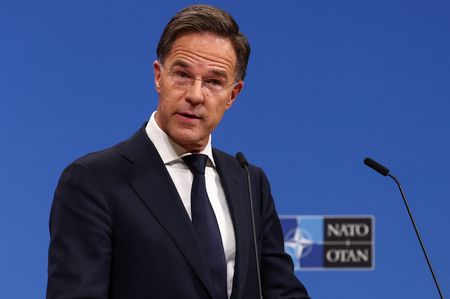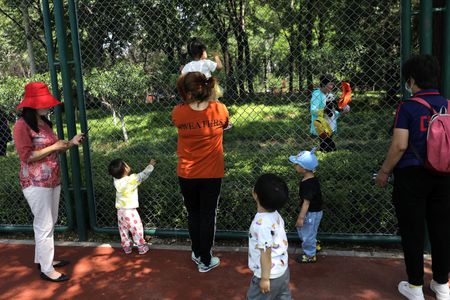By Karen Lema and David Lague
MANILA (Reuters) -The Philippines is confident in the continuity of U.S. policies in the Asia-Pacific region after the U.S. presidential election and the two countries’ ties will remain strong regardless of the outcome, Defense Secretary Gilberto Teodoro said.
Their alliance was anchored in shared security goals and a commitment to uphold international law, including in the contested waters of the South China Sea, Teodoro said in an interview.
He said that what he called China’s “misbehaviour” in the South China Sea has placed the Philippines at the forefront of regional security concerns.
“Simply put, China has given the Philippines some prominence that in normal terms, if everybody followed the rules of the road, if they didn’t do bad things, then this prominence of the Philippines would not be there,” Teodoro said.
“So, it’s all China’s fault right now because there is a felt need to band together because of their misbehaviour that this is happening.”
The U.S. election will take place on Nov. 5, with Democratic Vice President Kamala Harris and Republican Donald Trump locked in a close race.
China claims sovereignty over nearly all of the South China Sea, challenging Southeast Asian nations, including the Philippines, and recently Vietnam and Indonesia.
Last week, Indonesia expelled a Chinese coast guard vessel from its waters after it interfered with an energy survey, while Vietnam this month accused Chinese authorities of assaulting its fishermen in disputed waters.
“There is a pronounced aggressiveness of China’s expansionist agenda here,” Teodoro said.
In 2016, the Permanent Court of Arbitration in The Hague ruled that Beijing’s claims in the South China Sea have no legal basis, siding with the Philippines which brought the case.
But China has rejected the ruling, leading to a series of sea and air confrontations as the Philippines has ramped up patrols and resupply missions to defend its exclusive economic zone (EEZ) from Beijing’s encroachments.
The Chinese foreign ministry said the situation in the South China Sea was “generally stable” and it was working to try to resolve differences with countries through dialogue.
“The remarks made by the relevant officials of the Philippine side show once again that the Philippines is a troublemaker among the countries of the region by ganging up (on China) on the issue of the South China Sea, escalating tensions, provoking confrontation and showing off its force,” it said.
TREATY-BOUND
The incidents have raised risks of an escalation that could eventually involve the United States, which is treaty-bound to defend the Philippines if it is attacked.
“The probability of friction or conflict in the West Philippine Sea, it’s there. I cannot deny that,” Teodoro said, using the term Manila employs to refer to waters within its EEZ.
China has maintained that its actions in the South China Sea have been lawful.
While the U.S. last year laid out the extent of its defence treaty commitments to the Philippines in case of an armed attack in the South China Sea, Teodoro said the cooperation goes beyond that and encompasses stability, rule of law and joint capability building.
“What we are doing now with the United States is to build up our combined capabilities to deter such an armed attack from occurring,” he said.
The Philippines has also strengthened ties with allies like Japan and Australia, conducting joint exercises aimed at operational readiness, moves China views as provocative.
Teodoro is overseeing an ambitious military expansion that includes air defence assets, fighter jets, frigates and corvettes to fortify the country’s strategic shift away from internal to external defence.
“My conviction has not changed, that there is something that we need to deter, and the only thing that will change that equation is if China changes,” Teodoro said.
To support these acquisitions, Teodoro said he was exploring unconventional financing options and pushing to relax foreign and local borrowing limits.
(Reporting by Karen Lema and David Lague; Additional reporting by Joe Cash in Beijing; Editing by Raju Gopalakrishnan and Angus MacSwan)










